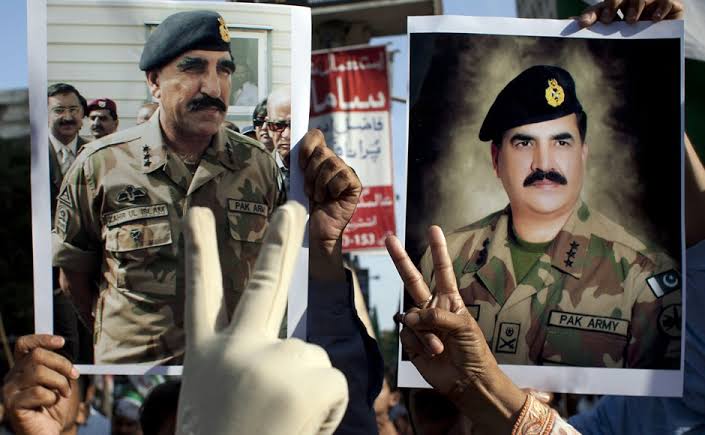Former United States (US) Ambassador to Pakistan Richard Olson has been quoted as disclosing that former army chief General (r) Raheel Sharif in 2014 foiled a coup attempt by the then director general (DG) of the country’s premium intelligence agency.
The ex-envoy was quoted by journalist and author Shuja Nawaz in the his recently-launched book “The Battle For Pakistan, The Bitter US Friendship and a Tough Neighborhood”, chapter “Mil-to-Mil Relations: Do More” of which further read that Olson made this statement in the context of the infamous 126-day protest sit-in by then opposition member Imran Khan in Islamabad.
“We received information that Zaheerul Islam, the DG ISI [Inter-Services Intelligence], was mobilising for a coup in September of 2014. (Army Chief) Raheel (Sharif) blocked it by, in effect, removing Zaheer, by announcing his successor… (Zaheer) was talking to the corps commanders and was talking to likeminded army officers… He was prepared to do it and had the chief been willing, even tacitly, it would have happened. But the chief was not willing, so it didn’t happen,” Olson was quoted in the book, launch events of which were cancelled across the country after its Washington-based author was allegedly told to do so.
’دا بیٹل فار پاکستان‘: شجاع نواز کی کتاب میں ایسا کیا ہے کہ پاکستان میں اس کی تقریب رونمائی نہ ہو سکی؟ – BBC News اردو https://t.co/tF6Rtf7Y5p
— Shuja Nawaz (@shujanawaz) December 28, 2019
Nawaz has authored a 373-page book covering the US-Pakistan relationship and important political events of the last decade and a half in Pakistan. Brother of former chief of army staff (COAS) the late Gen Asif Nawaz Janjua, he is an acclaimed author and well-reputed intellectual. His book, “Crossed Swords: Pakistan, Its Army and the Wars Within,” is considered the most authoritative history of the Pakistan Army.
In his latest book, The News reported, Nawaz reveals that for Americans, former ISI chief Lt Gen Ahmed Shuja Pasha was “straight shooting super nationalist general who had come into the world of intelligence on the insistence of Gen Kayani”.
According to the book, Pasha became an activist and an aggressive head of the country’s premium intelligence agency, expanding its operations and remit virtually at will and demanding greater access to information on US operations and operatives inside Pakistan.
According to Nawaz, Pasha was a prime target of American surveillance. He was being tracked during his travels abroad. The book provides details on the surveillance of Lt Gen Pasha.
Shuja Nawaz also states that during Pasha’s tenure, three Pakistan-US joint intelligence fusion cells were shut down and Pasha was a “bête noire” for Americans.
While quoting an unnamed US official, the author touches the subject of US intelligence surveillance inside Pakistan and says that the US had penetrated many Pakistani organisations.
The book says that, after Pasha’s retirement, new ISI head Lt Gen Zaheerul Islam was consumed by domestic issues. Islam spent most of his time on the political turmoil following the 2013 elections, which produced public sit-ins, or “dharnas”, by Imran Khan’s Pakistan Tehreek-e-Insaf (PTI) and allies against the government.
“Both Pasha and Islam’s names were associated with the street opposition to [then] Prime Minister (PM) Nawaz Sharif; though no solid evidence came to the surface. Islam was also a former head of one of the ISI’s wings or directorates, and then had been in the hurly-burly of Karachi politics as the corps commander there,” notes the book.
While the latest book by Shuja Nawaz is filled with firsthand accounts of Pakistani and US officials with direct purview of important political events in Pakistan and Afghanistan for a critical period of the region’s history, Lt Gen Zaheerul Islam and Lt Gen Ahmed Shuja Pasha have not given their views regarding their role in service.







